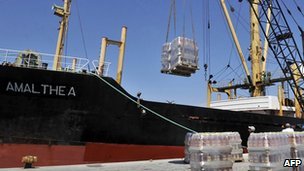 Israeli navy vessels are shadowing a Libyan-chartered ship carrying aid for Gaza, in defiance of the blockade, amid confusion about its final destination.
Israeli navy vessels are shadowing a Libyan-chartered ship carrying aid for Gaza, in defiance of the blockade, amid confusion about its final destination.
The organisers of the shipment, the Gaddafi Foundation, insist the Moldovan-flagged Amalthea is ignoring a warning from Israel to change course.
Israeli officials say the captain has agreed to divert to Egypt but the ship cannot move owing to engine problems.
The Amalthea left Greece on Saturday and was due to reach Gaza on Wednesday.
The attempt to break the blockade comes six weeks after nine activists were killed when Israeli commandos boarded another aid ship bound for Gaza.
On Monday, an Israeli military inquiry said it had found mistakes were made at a senior level during the operation, which sparked international outrage, but that the troops had been justified in using force.
The Israeli military announced that naval forces had "launched preparations and activity to stop" the Amalthea as it approached Gaza's coast on Tuesday, beginning with a "process of identification and communication".
But officials denied they had given the vessel an ultimatum to change course by midnight or face a forceful takeover.
Instead, they said, the captain had told them he planned to accept an offer from the Egyptian authorities to sail to the Egyptian port of El-Arish, where the aid would be unloaded and transferred by land to Gaza.
Motionless
A recording purportedly of the captain stating the Amalthea's destination was El-Arish was later broadcast on Israeli television.
Nine people were killed in May when Israeli troops boarded another aid ship
A crew member meanwhile told Israel Radio that its main engine had developed a fault, and that they did not know how long it would take to repair.
This was confirmed on Wednesday morning by Israeli military officials, who told the BBC that the Amalthea had stopped moving and was currently lying about 100km (60 miles) off Egypt and 120km (75 miles) from Gaza.
The Gaddafi International Charity and Development Foundation said communications had been jammed by Israel and that it was moving at a slow pace because of the warships surrounding it.
"The ship's captain was asked by the gunboat crew to go to El-Arish port instead, stressing that the vessel will not be allowed to go into Gaza at all," said the charity, which is headed by a son of Libyan leader Muammar Gaddafi.
"For his part, the ship's captain and the head of the foundation's team on board... affirmed that the ship's sole destination is Gaza, asserting that it is carrying humanitarian aid and has no other purpose whatsoever."
Israel has carried out intense diplomatic activity to try to persuade the crew not to attempt to enter Gaza's territorial waters.
The 92m (302ft) Amalthea, renamed Al-Amal (Hope) for the mission, is loaded with 2,000 tonnes of food, cooking oil, medicines and pre-fabricated houses. It is also carrying 15 pro-Palestinian activists and 12 crew members.
The Israeli government has in the past week lobbied the UN, as well as the Greek and Moldovan governments, to take action, calling the motives of the activists "questionable and provocative".
For the past three years, Israel has enforced a tightened economic blockade on the Gaza Strip, only allowing in limited humanitarian aid.
It says this is necessary to stop weapons for Palestinian militant groups inside Gaza being smuggled in, and to put pressure on the Islamist movement Hamas, which controls the coastal territory. Egypt has also closed its border with Gaza, only opening it occasionally.
The blockade, maintained by Israel adn Egypt, was widely described as "collective punishment" resulting in a humanitarian crisis for Gaza's 1.4 million people.
Last month, Israel announced it would ease restrictions by allowing consumer goods into the territory while banning or restricting trade in weapons and materials that could have a military use.



